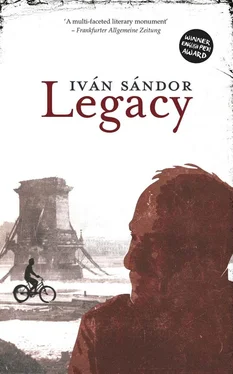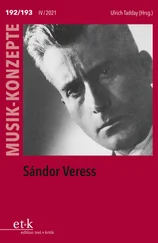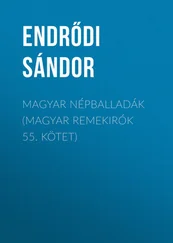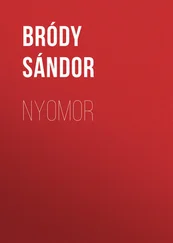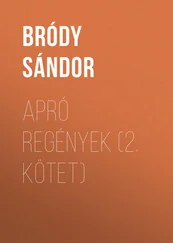I am holding it right now. I say my name into it this time as well. Is the one voice on top of the other?
When last week I described Carl Lutz’s steps at Keleti Railway Terminus I put on the record-player the ‘Adagio’ of Schubert’s String Quintet in C, which he had preserved from the playing of the two blind beggars standing by one of the exit doors that time he travelled to Berne to make his report in December 1944. Now I place the seashell close to the record-player; the music starts; I would like it to preserve the ‘Adagio’, the sound of which Lutz could never shake off.
It is dark. I carefully put the shell into my knapsack between the spare pullover and the warm socks.
I sneak out of the house.
I go across to number 76. The lilac tiles of its stairwell glitter in the dark. The door to the first apartment on the mezzanine floor is shut; that belongs to Vera’s family. The other door can be pushed open. I find myself standing in the Beifelds’ hall. In one corner is the card table; Mother and Father used to play here, although in the case of the ladies it was more a matter of playing rummy in one of the rooms inside. One of the cane chairs is placed exactly where, seated next to Father, I used to watch the slippery switching of cards in the deal.
The Persian wall hangings are missing from the dining-room, the paintings, too.
The second floor. The door to the Hirschs’ apartment opens if you push on the handle.
All the rooms here as well are familiar to me. I could almost taste the birthday cakes, but what now catches my attention is that a wall light has been left on. The curtains have been torn down, the doors on the wardrobes are wide-open, the chairs flung about; they must have stamped on the crockery in the kitchen and on the games in the children’s playroom, although a little figure of a cavalryman, my favourite, has remained intact, so I tuck that, too, in my knapsack.
I open the windows in the lounge. There is a full moon. The green velvet cover with the golden tassels has been swept off the piano; I set it back.
A flush door opens into the spare room. I find bed linen in the drawers of the divan bed. I tear the blackout paper off the window and don’t put the light on. I never did have a room of my own. I shall be able to read once it grows light: a good job I took the Encyclopaedia.
Bursts of submachine-gun fire are heard from close at hand from the corner of Korong and Kolumbusz Streets.
In the morning I wash in cold water. I choose one of the three coloured tooth mugs. I find half a tube of toothpaste, from which I squeeze some on to a finger. I give my socks and underpants a good wash and take clean ones from my knapsack. I go down to the mezzanine. Vera is drinking a cup of tea and eating bread and jam. The jam is cut off a block; I get some, too. I invite Vera to the Hirschs’ dwelling and show her how I’ve set myself up. We clasp hands in the stairwell, but once in the apartment she draws away from me and sits at the other end of the divan. I try to reach for her hand, but she won’t permit it. I ask her if she would like to move in here; I would relinquish my room — just the way it is, I say. I would find somewhere else to sleep. She says the Linnerts’ place is good enough for her for the time being.
In the summer my parents enrolled me to study music: out of the two-hour lifting of the curfew that was five minutes there and the same back. The woman who was teaching advised against the violin or the piano — they call for prospects, she said to my parents. The word was new to me, but I sensed that I understood what she was driving at. I would suggest the piano accordion, she said. You can learn the basics with ten or twelve hours of practice. She taught me Viennese waltzes and ‘Tango Bolero’.
I try to play ‘Tango Bolero’ for Vera on the piano. I hit the wrong key a few times.
She brings a chair, sits down, puts her elbows on the piano and cups her chin in the palm of her right hand. She is mimicking actresses such as Katalin Karády in Halálos tavasz (Deadly Spring) László Kalmár’s 1939 film based on the book by Lajos Zilahy. 2A good job she did not light up a cigarette. Her way of walking is just like Karády’s. I leave off ‘Tango Bolero’, step behind her and bend down to her neck. She doesn’t smell good; she can’t have washed, probably not for days by this time. She darts off to the bathroom; I hear the sound of the WC flushing. She comes back but not stepping like the actress and singer Katalin Karády. She says she is hungry, she’ll go downstairs; perhaps there’s something to have for lunch there. She takes my hand and pulls me along.
We eat in the kitchen — a thick brown soup of roux then a stew of boiled beans, both from the same dish. Vera leaves half of the beans in the dish. ‘Uncle’ Linnert is in his fifties; he has a silvery moustache, which droops into the spoon when he eats. He says they’re drawing closer, by which I suppose he means the Russians, although I can’t hear any guns. His voice is just like that farmer at Szilasliget, just to the north-east of Budapest, almost at Gödöllő, at whose house we spent a summer holiday when I was six. He would look up at the sky over the walnut tree and say, It’s going to rain, sod it! even when there wasn’t a cloud in the sky. Even when there was absolutely no danger of hail knocking down his orchard; even when he was waiting for a storm to break the long dry spell.
That afternoon I find blackout paper and drawing pins. I place the paper over the window, and by night I read by the light of a table lamp. I can hear bursts of submachine-gun fire from the same direction as yesterday. I switch the light off and open the window. Flames are shooting up from over by Kolumbusz Street.
I place in one of my folders a copy of the documentation:
One of the actions by Arrow Cross shocktroops which sought the greatest number of victims was directed against the Kolumbusz Street camp, which was under protection of the International Committee of the Red Cross. They broke into the camp despite the protests of the ICRC representatives who were present. The camp’s doctor was also shot dead when he protested in defence of the patients. The elderly were lined up and sent off to the ghetto; those aged between sixteen and sixty were herded off to Józsefváros railway station and packed into trains that were going to Bergen-Belsen.
I lean out of the window.
I can hear the bursts of gunfire.
I do not know what is happening.
Every day I pass the plaque that was unveiled twelve years ago in memory of Dr Kanizsai, the commandant and the other victims.
For supper we are given bread and a mug of tea. Mr Vespi says that the children cannot stay here because they will endanger the lives of the residents of the house. He doesn’t say that to us but to Uncle Linnert, Mr Vespi being the warden for the block. He has gingery hair and blue eyes and was a sergeant in the First World War. He was wounded in one leg and walks with a limp.
I go up into my room and make the bed. I take off my boots and britches, drape my shirt round the back of a chair.
Friedrich Born, the authorized ICRC representative, reaches Józsefváros railway station at a time when he is no longer able to prevent the loading into cattle trucks of those dragged away from the Kolumbusz Street camp.
I am freezing under the coverlet, so I put my shirt on anyway. I later find out that Mr Vespi has reminded Mrs Linnert a second time of her duty to report shirkers, as he puts it. What business does Mr Vespi have with the two kids, says Auntie Linnert, adding that she is well aware what the law says, and she’ll take care of it tomorrow. She doesn’t know what she and her husband ought to do, and what is the sergeant going to tell the Russians, she asks?
Читать дальше
